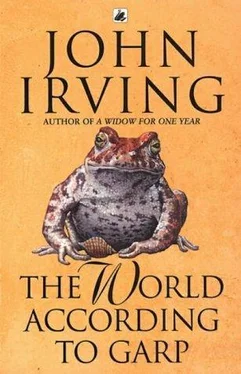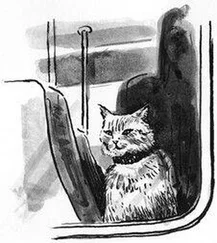“Thank God I've got money,” Charlotte said. “Isn't this a Class A place?”
Garp nodded. The next day he brought a bottle of wine; the hospital was very relaxed about liquor and visitors; perhaps this was one of the luxuries one paid for. “Even if I got out,” Charlotte said, “what could I do? They cut my purse out.” She tried to drink some wine, then fell asleep. Garp asked a nurse's aide to explain what Charlotte meant by her “purse,” though he thought he knew. The nurse's aide was Garp's age, nineteen or maybe younger, and she blushed and looked away from him when she translated the slang.
A purse was a prostitute's word for her vagina.
“Thank you,” Garp said.
Once or twice when he visited Charlotte he encountered her two colleagues, who were shy and girlish with Garp in the daylight of Charlotte's sunny room. The young one who spoke English was named Wanga; she had cut her lip that way as a child when she tripped while running home from the store with a jar of mayonnaise. “We were on a picnic going,” she explained, “but my whole family had me instead to the hospital to bring.”
The riper, sulkish woman with the peach pit pockmark on her forehead, and the breasts like two full pails, did not offer to explain her scar; she was the notorious “Tina,” for whom nothing was too “funny.”
Occasionally Garp ran into Herr Doktor Thalhammer there, and once he walked with Thalhammer to Thalhammer's car, they happened to be leaving the hospital together. “Do you want a lift?” Thalhammer offered him, pleasantly. In the car was a pretty young schoolgirl whom Thalhammer introduced to Garp is his daughter. They all talked easily about Die Vereinigten Staaten and Thalhammer assured Garp it was no trouble to drive Garp all the way to his doorstep at the Schwindgasse. Thalhammer's daughter reminded Garp of Helen, but he could not even imagine asking to see the girl again; that her father had recently treated him for clap seemed to Garp to be an insurmountable awkwardness—despite Thalhammer's optimism that people can adjust to anything . Garp doubted that Thalhammer could have adjusted to that.
All around Garp, now, the city looked ripe with dying. The teeming parks and gardens reeked of decay to him, and the subject of the great painters in the great museums was always death. There were always cripples and old people riding the No. 38 Strassenbahn out to Grinzinger Allee, and the heady flowers planted along the pruned paths of the courtyard in the Rudolfinerhaus reminded Garp only of funeral parlors. He recalled the pensions he and Jenny had stayed in when they first arrived, over a year ago: the faded and unmatched wallpaper, the dusty bric-a-brac, the chipped china, the hinges crying for oil. “In the life of a man,” wrote Marcus Aurelius, “his time is but a moment...his body a prey of worms...”
The young nurse's aide whom Garp had embarrassed by asking about Charlotte's “purse” was increasingly snotty to him. One day when he arrived early, before visitors were permitted, she asked him a little too aggressively what he was to Charlotte, anyway. A member of the family? She had seen Charlotte's other visitors—her gaudy colleagues—and she assumed Garp was just an old hooker's customer. “She's my mother,” Garp said; he didn't know why, but he appreciated the shock of the young nurse's aide, and her subsequent respect.
“What did you tell them?” Charlotte whispered to him, a few days later. “They think you're my son .” He confessed his lie; Charlotte confessed she had done nothing to correct it. “Thank you,” she whispered. “It's nice to trick the swine. They think they're so superior.” And mustering her former and fading lewdness, she said, “I'd let you have it once for free, if I still had the equipment. Maybe twice for half price,” she said.
He was touched and cried in front of her.
“Don't be a baby,” she said. “What am I to you, really?” When she was asleep, he read on her hospital chart that she was fifty-one.
She died a week later. When Garp went to her room, it was whisked clean, the bed stripped back, the windows wide open. When he asked for her, there was a nurse in charge of the floor whom he didn't recognize—an iron-gray maiden who kept shaking her head. “Frдulein Charlotte,” Garp said. “She was Herr Doktor Thalhammer's patient.”
“He has lots of patients,” said the iron-gray maiden. She was consulting a list, but Garp did not know Charlotte's real name. Finally, he could think of no other way to identify her.
“The whore,” he said. “She was a whore.” The gray woman regarded him coolly; if Garp could detect no satisfaction in her expression, he could detect no sympathy either.
“The prostitute is dead,” the old nurse said. Perhaps Garp only imagined that he heard a little triumph in her voice.
“One day, meine Frau ,” he said to her, “you will be dead, too.” And that, he thought—leaving the Rudolfinerhaus—was a properly Viennese thing to say. Take that, you old gray city, you dead bitch, he thought.
He went to his first opera that night; to his surprise, it was in Italian, and since he understood none of it, he took the whole performance to be a kind of religious service. He walked in the night to the fit spires of Saint Stephen's; the south tower of the cathedral, he read on some plaque, was started in the middle of the fourteenth century and completed in 1439. Vienna, Garp thought, was a cadaver; all Europe, maybe, was a dressed-up corpse in an open coffin. “In the life of a man,” wrote Marcus Aurelius, “his time is but a moment...his fortune dark...”
In this mood Garp walked home on the Kдrntnerstrasse, where he met the notorious Tina. Her deep pockmark, harboring the neon of the city lights, was a greenish blue.
“ Guten Abend , Herr Garp,” she said. “Guess what?”
Tina explained that Charlotte had bought Garp a favor. The favor was that Garp could have Tina and Wanga for free; he could have them one at a time or both together, Tina explained. Together, Tina thought, was more interesting—and quicker. But perhaps Garp did not like both of them. Garp admitted that Wanga did not appeal to him; she was too close to his own age, and though he would never say this if she were here and her feelings could be hurt, he did not care for the way the mayonnaise jar had pulled her lip askew.
“Then you can have me twice,” Tina said, cheerfully. “Once now, and once,” she added, “after you've had a long time to catch your breath. Forget Charlotte,” Tina said. Death happened to everyone, Tina explained. Even so, Garp politely declined the offer.
“Well, it's here,” Tina said. “When you want it.” She reached out and frankly cupped him in her warm palm; her big hand was an ample codpiece for him, but Garp only smiled and bowed to her—as the Viennese do—and walked home to his mother.
He enjoyed his slight pain. He took pleasure in this silly self-denial—and more pleasure in his imagination of Tina, he suspected, than he ever could have derived from her vaguely gross flesh. The silvery gouge on her forehead was nearly as big as her mouth; her pockmark looked to Garp like a small, open grave.
What Garp was savoring was the beginning of a writer's long-sought trance, wherein the world falls under one embracing tone of voice. “All that is body is as coursing waters,” Garp remembered, “all that is of the soul as dreams and vapors.” It was July when Garp went back to work on “The Pension Grillparzer". His mother was finishing up the manuscript that would soon change both their lives.
It was August when Jenny finished her book and announced that she was ready to travel, to at last see something of Europe—maybe Greece? she suggested. “Let's take the train somewhere,” she said. “I always wanted to take the Orient Express. Where's it go?”
Читать дальше












